Royce White Is the Most Important Basketball Player Alive

On a recent Saturday evening in Ontario, Royce White, a six-foot-eight, 270-pound power forward for the London Lightning, sat signing autographs for a long line of children. The mood was particularly jubilant that night, as the Lightning's 109-97 win over the Orangeville A's extended their winning streak to ten games.
White, arguably the biggest star in the fledgling National Basketball League of Canada, had played a significant role in the victory, with seven points, three steals, two assists and five rebounds in twenty-one minutes. The younger fans wiggled with excitement, some having waited thirty minutes for White and his teammates in a line that snaked around a gray corridor of Budweiser Gardens, a hockey arena that converts to a hoops venue for Lightning home games. That night's game had nearly sold out: 7,600 fans in attendance, fourteen to twenty-six dollars per adult ticket.
Lightning games can feel almost comically hospitable. Brenda, a librarian who sits courtside at home games and volunteers as a scorekeeper, brings homemade baked goods from a Tupperware container for the players. The local representative in Parliament, Peter Fragiskatos, purchased ad space in the arena to solicit constituent questions, comments, and feelings. Promotions for local real estate agents and appliance dealers line the exits. The arena remains cold even when it's set up for basketball-White wears long-sleeved shirts and pants under his uniform when he plays. He and his Lightning teammates appear in commercials for local restaurants like Angelo's Bakery and Burrito Boyz, flinging mounds of pizza dough in the air or holding up bags of takeout with a smile. It's as if minor-league baseball and the NBA had a Canadian love child: a professional hometown sporting event.
"I want to entertain them," White, twenty-six, says of his Canadian fans. "I want them to walk away from this and feel like they got their money's worth. These families, most people aren't rich, right? So for them to spend money and actually take the time out of their day, they could be doing anything in the world. That means something to me."
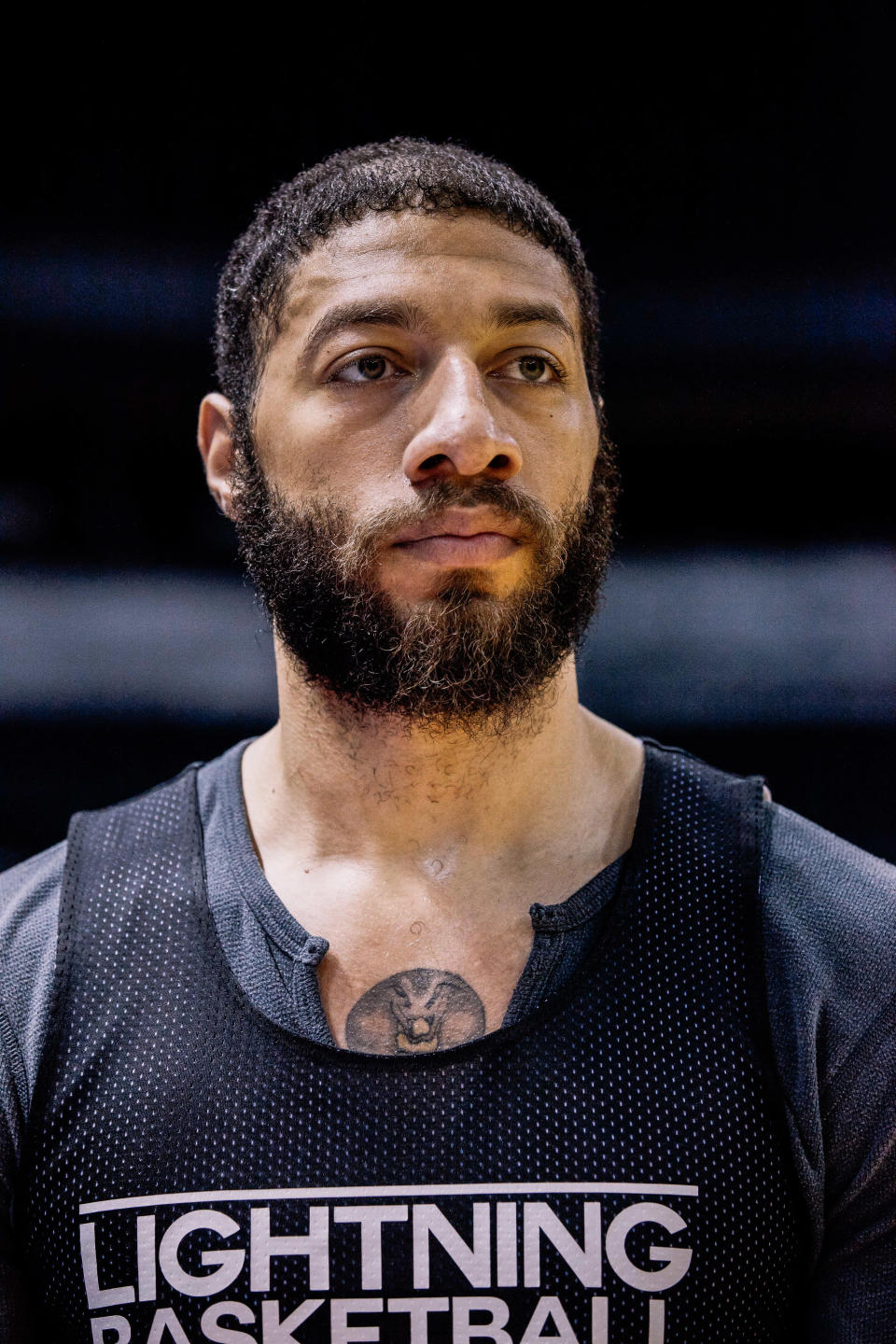
This is the last place anyone, including White, expected him to be. He was one of the best high-school prospects in years from his home state of Minnesota, a college standout at Iowa State, and the sixteenth draft pick in the 2012 NBA draft, signing a $3 million two-year rookie contract deal with the Houston Rockets. But when training camp opened that fall, White was nowhere to be found. After returning to practice with the team, he disappeared again without playing a game. By the first week of 2013, he was off the team, having balked at a reassignment to the D-League. When he signed with the Lightning last December, he hadn't played competitive basketball in nearly three years, since a three-game stint with the Sacramento Kings in March 2014.
Everyone involved agrees the reason for White's rapid fall from the highest levels of basketball had nothing to do with his talent, which is by all accounts NBA-worthy. Instead, his exodus to London is the product of a years-long standoff with the NBA over how it addresses mental health issues-both his own and other players'. In short, his complaint is that the league doesn't address those issues at all: Unlike almost every aspect of players' physical health, players' psychological well-being was not mentioned in the collective bargaining agreement that governed their contracts at the time White was drafted. When White, who was diagnosed with generalized anxiety and obsessive-compulsive disorder as a teenager, asked the Rockets to allow him to ride a bus to many away games instead of flying on the team plane-flying triggers his anxiety-they had no idea how to handle the request, he says. When he asked for a meeting with then-commissioner David Stern about the issue, he was rebuffed. And so, until the league develops what he sees as a more comprehensive plan to address mental-health treatment, he says, he'll never play another NBA game. He says he's already turned down numerous offers to play, adding that he believes the fight has already cost him tens of millions in wages.
The NBA falsely interpreted his stand as arrogance, he tells me between autographs and selfies with young Lightning fans. The two of us are seated between the cinderblock walls of Budweiser Gardens and the plastic autograph table, White's Lightning teammates on either side. Although White hasn't had time to shower since the game, he shows no signs of sweat or fatigue as he chats about a variety of topics, offering dozens of high-fives along the way. "It's not what they're used to," he says of the league. "They're used to young black men just coming in and saying, 'What do you need me to do, master?' That's what it is. Be straight up about."

White considers his battle with the NBA a civil-rights fight. But it's also a conflict over what a sports league is, and what it should be. Is it merely an employer, entitled to demand that its workers meet certain requirements in exchange for salaries? Or is it more like a community, responsible as much for the well-being of three hundred young men as for their professional performance? White never viewed the NBA as a company to work for-to him, it represented a different, almost religious, kind of community and a culture with a societal responsibility beyond hardwood courts. Therein, still, lies the problem.
"I find it offensive that they don't feel that they are more than a sports league," White says of the NBA. "They tell the players to 'represent yourself, your family, your community, this organization, in a way that you'd be proud of.' So that lets me know you understand it's bigger than the game, bigger than four quarters, bigger than practice, bigger than the training you do. It's bigger than the money you make."
White isn't sure whether his efforts will ever land him back in the NBA, but he says the fight is bigger. For now, his battleground for his playing career and his cause is this rust belt, snow-covered town of 380,000 in Canada. It is here where he continues to fire off social media missives about mental health, lobby the NBA, and hit the weight room in order to get back into shape after so many years away. Now he and those around him are wondering: Will it work?
It's common for fans to come up to White after games and spill their stories to him about their own battles with mental health, or to send him messages through Twitter and Instagram. He tries his best to respond to people individually, whatever their demands are of his time. But he's the first to admit he's still trying to figure out a lot of it himself.
"I'm fucking weird," he says.
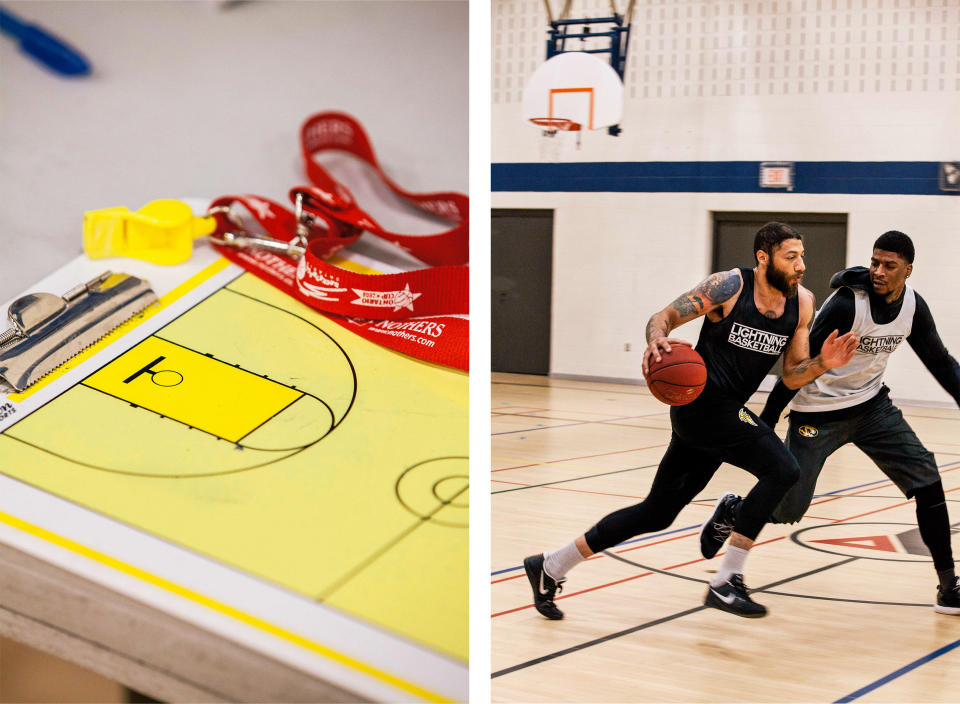
It's still considered a taboo for men to talk feelings-especially if they've been diagnosed with a mental illness. The stigma is compounded for men of color, and for professional athletes, who are often expected to be strong no matter the situation. But evidence indicates that athletes may be even more susceptible to mental-health issues. All told, an estimated 16.1 million adults, or about 6.7 percent of the adult population, had at least one major depressive episode in the past year, according to the National Institute of Mental Health. Meanwhile, an NCAA survey found that 30 percent of student athletes reported feeling depressed in a one-year period, while 50 percent said they experienced high levels of anxiety. A slew of other researchers have also found athlete mental illness rates well above non-athlete averages.
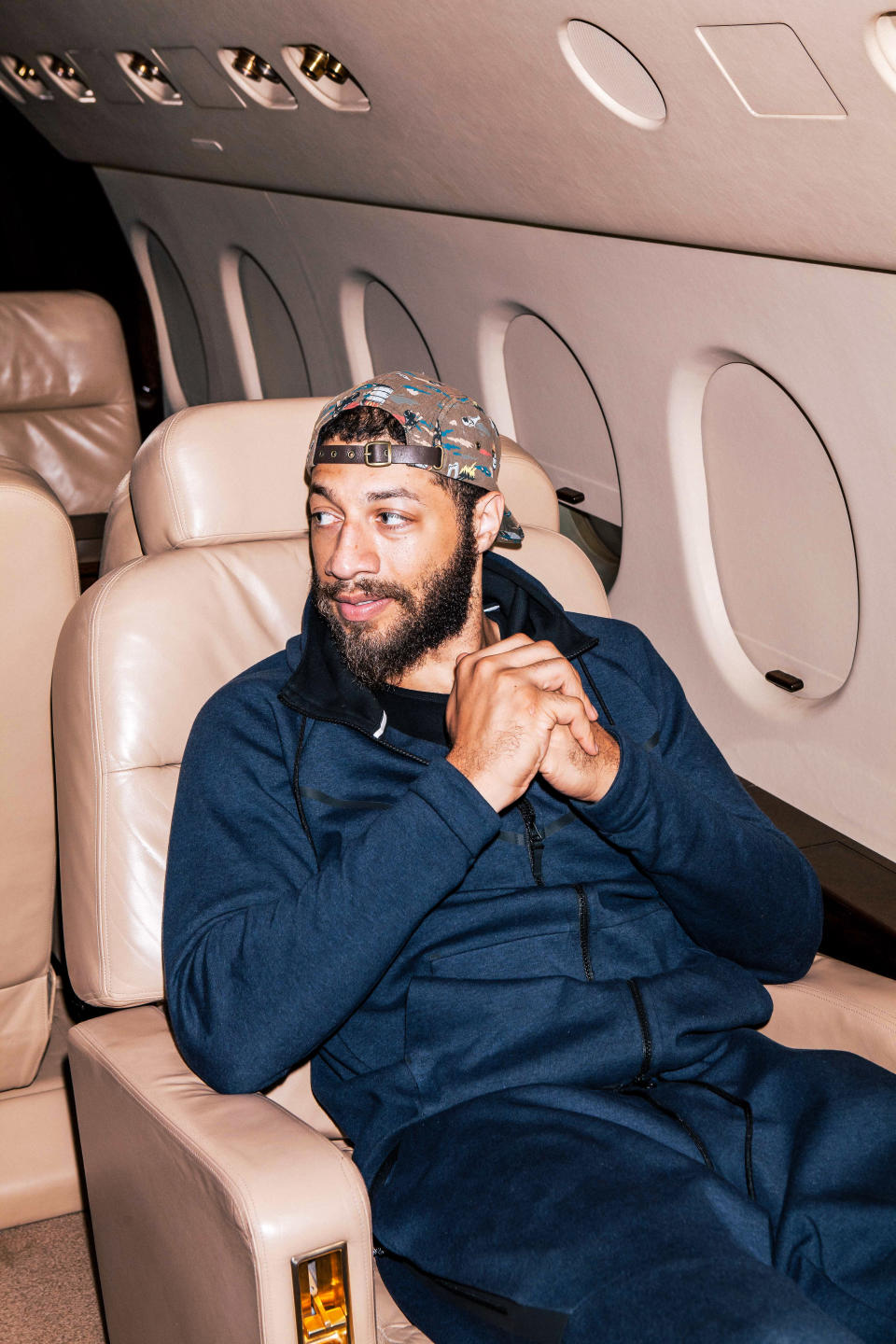
Meanwhile, the age of peak athletic performance in many sports, including basketball–early to mid twenties–is also the most common times to be diagnosed with many major mental illnesses. Precisely at the moment when an athletic career is most on the line and fan perceptions of a Herculean, supra-human performance are highest, an athlete's brain may be at its most vulnerable.
In the past several years, athletes who have been diagnosed with everything from depression to anxiety disorders to bipolar disorder have begun speaking out. NFL Hall of Famer Deion Sanders, swimmer Ian Thorpe, boxer Oscar de la Hoya, among others, have discussed their mental health experiences. Larry Sanders of the Milwaukee Bucks spoke of his battles with depression and after winning an NBA championship, Metta World Peace (then known as Ron Artest) even publicly thanked his psychiatrist.
But few, if any, have followed White's lead in putting their dream on hold-and turning down a massive paycheck-to take a stand on mental health policies. The salary cap in the Canadian league is $150,000 Canadian dollars (about $110,000 U.S.), a fraction of the NBA's minimum $543,471. White's decision not to return to the NBA has baffled many in the basketball world. But the Canadians offered something more valuable than money, White says: a robust mental health care system for players.
Like the NBA, the NBL has no formal written mental-health policy, a spokesman for the league said. But unlike their counterparts in the U.S., players benefit from Canada's more progressive stance toward mental health, including vastly more government-backed programs and awareness campaigns. "It was like treating anything else, like an injury or any issue," Lightning coach Kyle Julius tells me of the team's philosophy on mental illness. Today, White said he takes medication as needed and relies on the help of several psychologists and friends to talk him through his anxiety, both in the moment of panic or when he's feeling calmer.
I find it offensive that they don't feel that they are more than a sports league. They understand it's bigger than the game, bigger than the money you make."
All of that, White says, is worth the pay and prestige cut, even if no one outside of his sphere understands his position-including the three agents he's cycled through in the past couple of years. When it became clear White wasn't going to budge on his stance, leaving money on the table, he said they lost interest. "They didn't get it because the culture is built around us not having those genuine conversations," White said. "I've even had teams say that, 'We like Royce. Royce is talented enough to play in the league, clearly, but we don't want him to be a distraction.' Like philosophy is a distraction. See? That comes from an age of greed and selfishness and self-absorbance. For us to talk openly is the only answer, in my opinion."
While mental health is covered under the Americans with Disabilities Act, the NBA is newer, more challenging, legal territory. "Our players live under a magnifying glass," said Kathy Behrens, the league's president of social responsibility and player programs. Major sports leagues have mostly dodged spelling out mental-health protocols for athletes. The National Football League offers a hotline for players and families, but does not address mental health specifically in its legally-binding, collective bargaining agreement. Nor do Major League Baseball or the National Hockey League specify mental-health protocols in their agreements with player unions-even after the NHL's behavioral-health program was the subject of a lawsuit by the family of Derek Boogaard, an enforcer with the New York Rangers who committed suicide in 2011 at age twenty-eight.
The NBA is "in the process right now" of adding more mental-health protocols to the new collective bargaining agreement, according to Behrens. The new agreement, which will become effective July 1, is still being reviewed by the NBA Players Association, but Behrens said it represents "really more of an enhanced program to the offerings we have." Among the specific measures: rookies will participate in a required mental-health session, and team doctors and psychologists will be available to players at the league's expense. While some of those resources were available before, the new CBA will formalize them, as well as the league's commitment to addressing issues case by case-a philosophy White says wasn't in place when he was in the league. That's progress, White says, but still not sufficient: It still doesn't deal with what specifics constitute "reasonable accommodation" for players in the unconventional workplace, or establish a mental-health baseline for all players.
Behrens declined to comment on the specifics of White's case, but said his outspokenness about mental-health issues represented a step in the right direction. "I give Royce a lot of credit for being open about his situation," she said. "I think one of the things we've learned the most and focused on is helping players understand that it's okay to ask for help and take advantage of the resources and systems we have in place." (A representative with the Rockets did not respond to requests for comment.)
London, Ontario, sits halfway between Detroit and Buffalo, a description that applies as much to its soul as to its geographical coordinates. The buildings sprawl out on wide streets, seldom traveled by locals on foot, and are a mixture of stale 1970s concrete and beautiful, century-old homes constructed in the town's heyday and carefully preserved since. A Ford plant nearby recently closed, one of many storefronts now sitting empty-downtown looks a bit like a mouth with some teeth missing. Two hours from Toronto, London is also known as the birthplace of pop star Justin Bieber, home of the University of Western Ontario, and a hub for hospitals. During my time there, people described alternately living there as "hell" and "perfect and homey."

Since its founding in 2011, the Canadian Basketball League (known as the NBL) has struggled to gain fans, particularly in smaller markets. (The branding of teams like the St. John Mill Rats, now the St. John Riptide, probably didn't help, either.) In 2015, the league had to cancel game seven of its championship at the last minute when the two teams got into a physical altercation, known as "the Washout in Windsor," according to Morris Dalla Costa, the Lightning's lone beat reporter. At the time, the league had burned through three commissioners in four years and, among other issues, Dalla Costa noted, "announced a television contract that didn't exist." (Today, games are streamed on YouTube for free.)
Yet despite the tumult, pay cut, downgrade in hotels, tinier audience, and lack of shoe contracts or high-end catering, White found the idea of helping build the scrappy league appealing. White's current agent, Brian Brundage, had sent his client to the Clippers' summer league and pitched him on some teams overseas, including one in the Philippines, but White was wary of going too far from his family in Minnesota. Seeing some American players heading to Canada, Brundage says he reached out to White, who was open to the idea, and officials there to gauge their interest. Before the Lightning signed a deal, they engaged in what owner Vito Frijia calls "aggressive research," calling White's former teammates and coaches. But overall, the process was more focused on whether White liked the team than the other way around, and Frijia made a strong pitch for the league. "It's a question of caring for your players," Frijia says.
Neither Frijia nor Lightning coach Kyle Julius was worried about a repeat of White's conflict with the NBA. The multi-year break from the game "made it a grind to get back in shape," he adds, "but I think he's been fantastic." "There weren't really any cons, other than, is he gonna want to stay here?" he continues. "Is he gonna enjoy it? Is he gonna wanna live this way? It's tough when you get guys that have been in the NBA and at those highest levels. You often wonder, coming down to this level, how it'll affect them, and then, you're concerned about their ability to just accept life at this level. No one comes to London for the nightlife."
But White found something comforting about the idea of living in London; it reminds him of his hometown of St. Paul, Minnesota. When they moved from St. Paul to London last year, White and his wife Angelic Aguilar, who goes by 5iive, swapped their apartment downtown for a modest condo about 10 minutes from the arena.
I give Royce a lot of credit for being open about his situation. We've focused on helping players understand that it's okay to ask for help.
White became a father at nineteen when a woman with whom he had a casual relationship gave birth to a daughter. A second child came soon afterward from another woman, then he had two more with Aguilar. By his early twenties, he was a father of four with the grueling traveling schedule of a professional basketball player. His two older children live in Minnesota while his two youngest live in London with him and Aguilar. He prefers not to go into detail about his two older kids or how often he sees them.
"It's not easy. My whole family life, in general, has not been easy," he says. "There are many instances where I've helped other kids more than my own." (He recently shaved his head to show support for a young Lightning fan undergoing treatment for leukemia.) "That's the burden you have to walk with. For example, let's say you're a doctor who is on call all day, and you barely get to see your kids. Are the kids losing out? Is the tradeoff equitable? How do you measure that and how do you know who needs more of what? That's a problem in my heart of hearts."
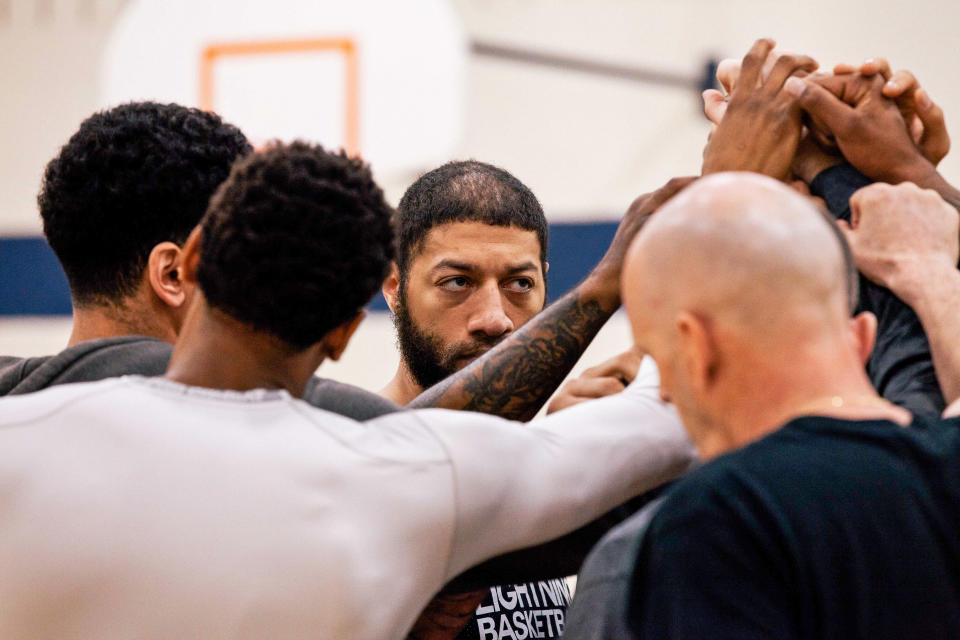
White didn't have a choice about other aspects of his personal life going on public display. His absence from the Rockets was widely reported as a result of his fear of flying, but he says now it was more about the team and league's unwillingness to accommodate his illness more generally. Weeks of back and forth with the NBA, the NBA Players Association, the Rockets front office, and agents dragged on while White sat out. He was transferred to Houston's D-League affiliate, the Rio Grande Valley Vipers, but refused the assignment. In July of 2013, the Rockets traded him to the Philadelphia 76ers, who waived him shortly thereafter. A similarly short stint with the Sacramento Kings followed, and White played with the Los Angeles Clippers in the Orlando Summer League in 2015, but he has not seen regular game play since college. "This ain't only about flying," White told me, sitting in his car before a team dinner on a recent winter night, replaying the NBA fight. "This is about consistency."
At the time, White's battle with the league became the subject of conversation far beyond the basketball gossip mill. "Maybe some of [the fans] are just paying extra attention to me because of all the hype around what's goin' on," he says. "You gotta embrace that."
Sitting in his car before dinner, I notice it's clean, but not obsessively so: a gym bag with sweats tossed in the back seat, clumps of snow on the rim, some dust on the dashboard. When he pulls out his iPhone, though, it's meticulous: files, songs, and apps and OneNote files are rigorously color-coded.
White says he can fly, but it often involves having to take a Xanax, which can make him fatigued the next day. If undrugged, his body remains in a "hyper-alert" state that also renders him exhausted. "Being 30,000 feet in the air feels like you have no control," White says. "And you really don't. In a bus, I can gauge speed. I can gauge environment, because I can see out of the windows, I can see what's going on. In the plane, you got this little window that you can see out of left, or you may be able to get across the row and see out of the plane right, but you don't know what else is out there." Today, he says travel is "no problem," and many of his road games in Canada involve bus travel. He recently had to fly with the Lightning to the Maritimes for games. "I didn't like it," he said, "But I was fine."
There are many instances where I've helped other kids more than my own. Is the tradeoff equitable? That's a problem in my heart of hearts.
Talking to White means volleying between existential philosophy, NBA chatter, pop music, the nuances of the Americans with Disabilities Act, and everything in between. He's a philosopher in a power forward's body, known by his teammates in London as much for his musings and heavy conversations as for his passing technique. He cites Prince, a fellow Minnesotan, as a profound influence for standing up against exploitative music-industry contracts. "If you don't own your masters, your master owns you," White summarizes.
Like Prince, White's genetic makeup background weaves together many different cultures: white, Mexican and black. "When you get that form that says, 'Check which box,' I'm like, 'Ah, I'm everything,'" he says. "I just put 'American' in that 'other box.' I'm that guy. I'm that asshole."

During his time off from basketball, White spent some of his additional free time researching his family tree. His great-grandfather Louis White Jr. was a top baseball prospect who played in the Negro Leagues. His grandfather, Frank White, wrote a book about African-American baseball in the midwest, while his uncle is MLB Hall of Famer Dave Winfield. His great uncle, Dr. Alfred Owre, was the dean of the dentistry school of the University of Minnesota, and pushed against established norms of teaching dentistry, but died before his methods were accepted in the mainstream. "Genetics is freaky," White says. As he read through quotes from Owre he came across in his research, he found many centered around bucking the norms of the era, which he now stores on his iPhone. "It sounds so much like me," he says.

As a child, White dreamed of joining his idols Michael Jordan, Scottie Pippen and Ron Harper in the NBA, spending hours and hours shooting hoops by himself. He was raised chiefly by his single mother, an esthetician, and his grandmother, who shuttled him to and from basketball practice and encouraged him to study topics he didn't understand. His father wasn't around until White's teenage years, but there were other prominent men in his life, including two grandfathers, uncles and a bunch of coaches. "My mom made sure that I was around males that could offer something of substance," White says. "I didn't grow up around men who saw emotion or expressing emotion as weakness or as feminine."
It was in high school that White was diagnosed with generalized anxiety disorder, thanks in part to an in-school family practitioner. "She saved my life, and helped improve it," he says. He began to see a therapist, and had coaches in high school and at Iowa State who were accommodating when he had panic attacks, anxious thoughts, or obsessive tendencies. Knowing that eating before games made him nervous, his coaches allowed him to sit out team meals. Because flying could tax him, White made plans to arrive a few hours or a day ahead of the rest of the team to leave time to readjust.
His encounters with law enforcement, he said, were very different. In October 2009, White was charged with, and ultimately pled guilty to, disorderly conduct stemming from an incident in which he was accused of stealing $100 in merchandise from the Mall of America and pushing a security officer to the ground. That November, he was charged with three counts of misdemeanor trespassing in connection with a laptop theft at a dorm. "Both of those were dumb, us being silly, young and doing dare type of stuff," White says now, arguing that police should have been more lenient. White had been suspended indefinitely as a result, but through a high GPA and good behavior earned his spot back on the roster after missing several games. "We weren't maliciously trying to hurt people. If 'Jackass' did it, everyone else would have a hoot about it. All young people that age have impulses to make each other laugh and do funny shit. It's the context in which people do it. With athletes, and young black males in particular, there's no room for context of what happened."
Meanwhile, on the court, White flourished. He was voted the Big 12 preseason Newcomer of the Year in 2011, and became just the fourth player in Iowa State history to record a triple-double. As White began to attract more attention, he says, he began to discuss his NBA future, and life more generally, with his coach there, Fred Hoiberg. (Hoiberg, through a Bulls spokesman, declined to comment, citing his schedule with the team.) "Everyone said they agreed I had NBA talent," White says now. "But people were a little concerned about the anxiety thing."
White decided to bypass his junior and senior years at Iowa, got an agent, and went to NBA workouts, causing his stress levels to flare. After he was drafted by the Rockets, and it became clear in conversations with his agents, officials, and other players that there was no provision in the NBA's labor agreement addressed mental health, he was confused, anxious, and unclear what his life in the league could look like. Suddenly, one of the hottest draft picks was a man without a team.
"The NBA was put in a tough, tough spot," White said. "Not because mental health is a hard conversation, because it's not. Because they're a human commodity business and they always have to juggle human welfare vs. profit. That's not hard, depending on what your moral code is."
The NBA impasse made for White's longest hiatus since he had started playing as a child. White said he spent most of the time in Minnesota playing with his with his kids, making music, writing screenplays, reading, and playing chess, a pastime he's enjoyed since childhood. He did not get paid his signing bonus for the Rockets, but said coasted along on funds from some speaking gigs and odd jobs. "He basically got nothing" from the NBA, Brundage, White's current agent told me.
White worked through some of his feelings in his in-home music studio, where he plays piano, sings, and composes. A man of many iTunes, White's discography encompassses everything from Jay-Z and Queen to Prince, Adele, and the Beatles. He has a large tattoo of Frank Sinatra on one arm, along with the Minnesota Twins logo, a lion, and an Achilles quote from Homer's The Iliad, "There are no pacts between lions and men." "I found peace in that," White says.
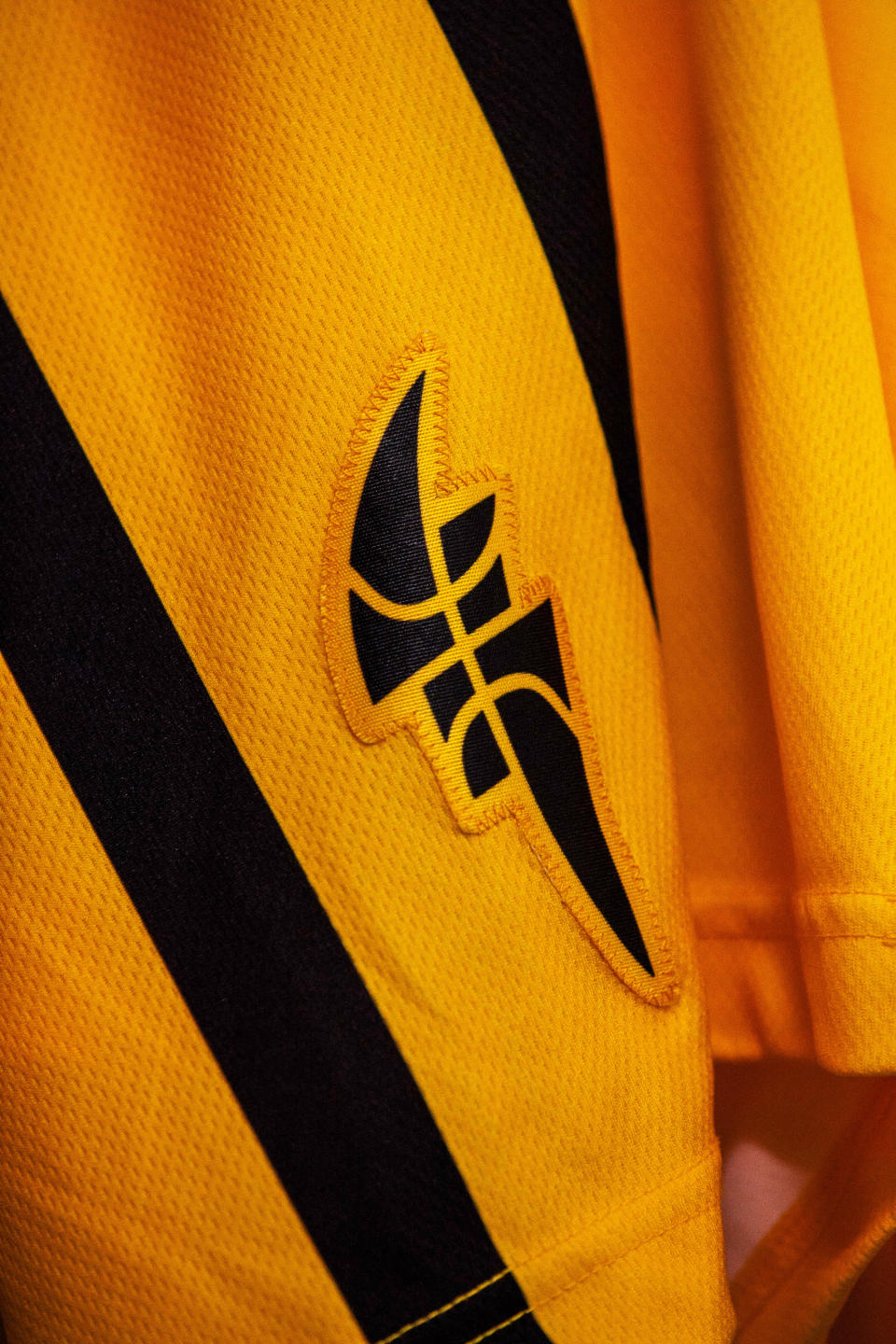
"To be honest, it was kind of nice having him around," says Aguilar, who has striking green eyes and long raven hair, while sitting in the Lightning's practice gym watching the couple's son toddle around the court playing with some of the other players' children. A babysitter is home with their infant daughter at the condo. The gym, which Lightning players can access at any time, is new, and clean without many frills, akin to a nice suburban YMCA. Players and their families come in one by one, a few, including White, sitting on the countertops of an adjacent kitchen space. They noshed on roasted chicken, potatoes and salad from a large catering dish, White's plate a mound of poultry. He easily cradled the dish with one hand-his is 11.5 inches wide, the largest in the NBA draft combine the year he entered the league.
"It's time you can't get back with these kids and he had been gone so much before that," Aguilar says, watching their son squeal as White and the other players take turns hoisting him high up on their shoulders. "He's their superhero."
The NBA was put in a tough, tough spot. They're a human commodity business and they always have to juggle human welfare vs. profit.
Aguilar played basketball in high school too, and her family tree also has athletes on several of its branches. These days, she works as a model. "A high school jock and a model," White jokes. "How cliché is that?"
Living with White's anxiety isn't always easy, Aguilar says. There's the obsessive organization of books and the color-coding of suits in his closet. Her father ran a cleaning company, so Aguilar said she appreciates the attention to detail-to a point. She draws the line at alphabetizing DVDs, a practice she finds useless and White finds essential, even comforting. "We're very similar in that we're organized," Aguilar says, "But he's like me on steroids. You can see that it makes him feel good to organize things. The kids' closets? Forget it. I don't really let him in there."
The move meant a twelve-hour drive to St. Paul, where most of both Aguilar and White's families still live. "It was a big decision to come here," she says. "We were leaving everyone at home. But there's a family base here. I'm very family-oriented. That was important to me."
Nor did White's fracas with the NBA (or the millions he potentially left on the table) cause friction in their marriage, she says. "If he isn't in a good place, I'm not in a good place. I'm a nurturer by nature and with the little ones, especially, we needed a schedule. We needed a routine. That was always first."
"She understands exactly where I'm coming from," White says. "I don't regret any of it for a second."
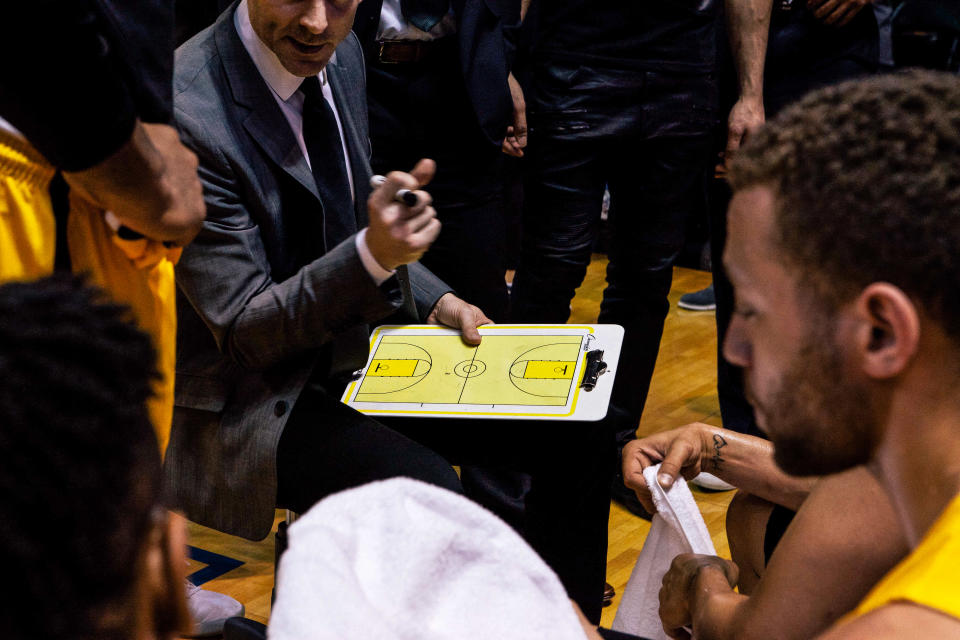
Heading into the playoffs, which start this week, the Lightning had the best record in the league, at 35-5. White is third in the league in rebounds with 357. He's fourth in points, averaging 19.68 per game. That number would be higher, but it's clear that White enjoys passing to other forwards, seeing himself as an anchor in the offense.
There are times when the talent disparity between White and the other guys on the court is nothing short of comical. One of his talents as a player is a high level of court awareness-a deep understanding of who is open and best positioned to execute big shots. But his teammates often don't share his foresight. More than once during a February game, White passed the ball to an open teammate, only to watch it pelt him in the side. When a pass is successfully received, the teammate often has a look of surprise. "He was, like, startled by it," White tells me later about one of these instances. "That's okay though. We're learning that. It's just a learning curve, a learning process."
His presence has already made an impact on his teammates. Ryan Anderson, a plucky shooting guard who played for Nebraska in college, says he knew of White's standoff with the NBA long before he came to the team, but wasn't sure how much of it was true. The two became friends. "He told me his side," Anderson says, "Not just what was in the media. That it was something he felt was worth fighting for. He's taught me that sometimes things are bigger than basketball."

In late March, White abruptly flew home to Minnesota, missing one Lightning game and a couple of practices to "deal with a family emergency," he says, declining to elaborate. It was unrelated to his anxiety, he says, and he was pleased with how the Lighting handled it. The London Free Press initially reported that White was out because of a mental-health issue, but Dalla Costa later changed his article to note that it was a family situation, not White's anxiety disorder. "But any family emergency is going to, by nature, make you anxious," White says.
Over time, he says, he has gotten better at dealing with his anxiety, "but I still struggle to find those moments of relief during the day." He takes Xanax or Klonopin as needed, sees a therapist, and makes a point of talking to friends and professionals on the phone or in person, especially when his anxiety reaches a zenith. "They talk me down," he said. "It really, really helps. There are still those moments when you're struggling to find relief during the day."
Maybe some of the fans are just paying extra attention to me because of all the hype around what's goin' on. You gotta embrace that.
In spite of some of the bumps, White says he's optimistic about the future of the NBL. Like the league, White is in something of a startup mindset: He's trying to build a media company, and has started a nonprofit, Anxious Minds, to focus on mental health advocacy. Brundage, White's agent, says he hopes to approach NBA coaches when the NBL season ends. While teams are waiting to see how he finishes the season, White is waiting to see how the mental-health policies change in the new CBA. He is also trying to take decisions, including those on his future in basketball, as they come. "It's easy to get caught up in the bullshit and lose sight of what's important," he says.
For the moment, though, White says he's "a ten" in terms of his happiness in London. The very act of playing the game, whether on a small or large court, represents an affirmative act against his own demons and any societal expectations that used to confine him.
White argues that really, he's not that different than anyone else. That's part of what he thinks spooks people about his frankness in talking about his brain's quirks-on some level, they feel like he's talking about them too. "It's not that I suffer from anxiety disorder and 'Woe is me," or 'Woe is the people who suffer from anxiety disorder or mental illness,'" White says. "Because the reality is that pretty much everybody suffers from mental illness in some capacity. So, really, woe is everybody."
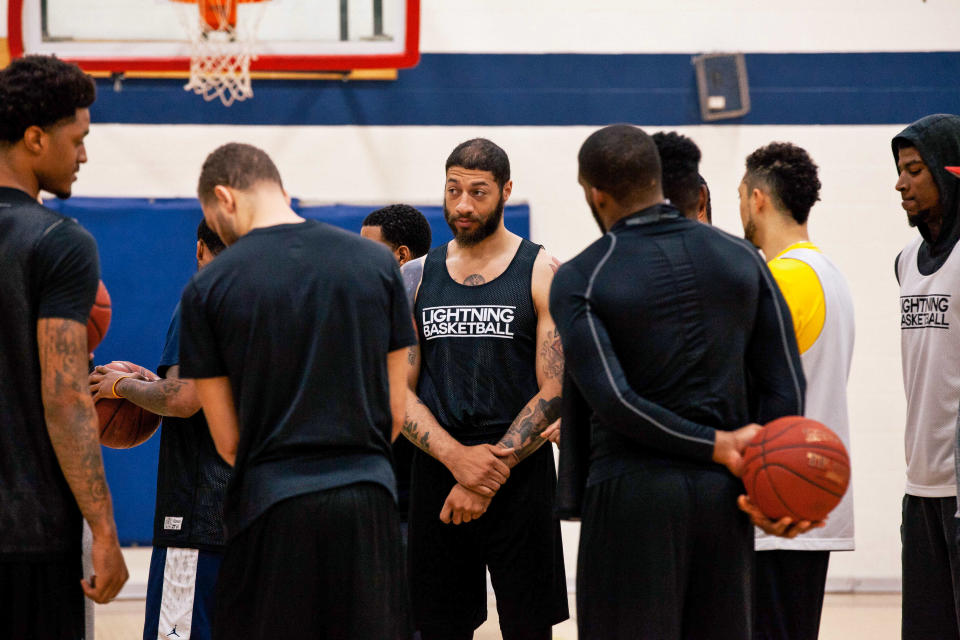
Photography by Aaron Wynia.
Video by Jake Sherman.
You Might Also Like

